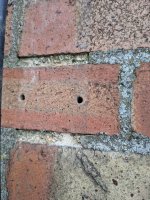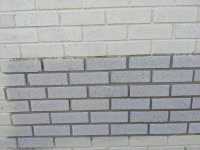Hi all,
I'm looking at getting my house and extension rendered, but the front wall of the original house is most urgent, as it needs to be done by this winter if possible. The house was built in 1932 and is constructed from fletton common bricks with lime mortar. At some point in its life it was repointed with cement based mortar. The brickwork needs repointing in places now, but we are looking at rendering the house and extension together.
The extension is built with concrete common bricks, that have been painted with magnolia paint which is starting to peel badly in places due to getting a lot of rain with little shelter where we live.
For the extension, a local sandblasting company will be removing the paint soon, taking it back to bare (concrete) brick.
But, what do we need to do to prepare the fletton bricks? The repointing that was done years ago looks flush with the brick face in most places.
I've been looking at lime renders for the original house wall (Parexal) and the notes say that if the surface has all loose material removed and wetted it can go straight onto brick. But I've seen lots of other renders mentioning problems with fletton bricks and to use a key coat of a special product.
What do you think is necessary (the renderers around here are very busy, so haven't been around to look yet)?
I've attached a picture of the original house brickwork. There was a piece of trunking covering a cable which was removed, and you can see the original lime mortar underneath.
I've also attached a picture of the extension brickwork after a test patch was sand blasted.
I'm looking at getting my house and extension rendered, but the front wall of the original house is most urgent, as it needs to be done by this winter if possible. The house was built in 1932 and is constructed from fletton common bricks with lime mortar. At some point in its life it was repointed with cement based mortar. The brickwork needs repointing in places now, but we are looking at rendering the house and extension together.
The extension is built with concrete common bricks, that have been painted with magnolia paint which is starting to peel badly in places due to getting a lot of rain with little shelter where we live.
For the extension, a local sandblasting company will be removing the paint soon, taking it back to bare (concrete) brick.
But, what do we need to do to prepare the fletton bricks? The repointing that was done years ago looks flush with the brick face in most places.
I've been looking at lime renders for the original house wall (Parexal) and the notes say that if the surface has all loose material removed and wetted it can go straight onto brick. But I've seen lots of other renders mentioning problems with fletton bricks and to use a key coat of a special product.
What do you think is necessary (the renderers around here are very busy, so haven't been around to look yet)?
I've attached a picture of the original house brickwork. There was a piece of trunking covering a cable which was removed, and you can see the original lime mortar underneath.
I've also attached a picture of the extension brickwork after a test patch was sand blasted.


